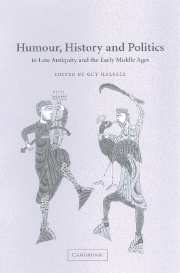Book contents
- Frontmatter
- Contents
- Notes on contributors
- Preface
- List of abbreviations
- Introduction: ‘Don't worry, I've got the key’
- PART I THE FATE OF HUMOROUS WRITING
- 1 Laughter and humour in the early medieval Latin west
- 2 Humour and the everyday in Byzantium
- PART II HUMOUR AND THE POLITICS OF DIFFERENCE
- PART III HUMOUR, HISTORY AND POLITICS IN THE CAROLINGIAN WORLD
- Index
1 - Laughter and humour in the early medieval Latin west
Published online by Cambridge University Press: 24 July 2009
- Frontmatter
- Contents
- Notes on contributors
- Preface
- List of abbreviations
- Introduction: ‘Don't worry, I've got the key’
- PART I THE FATE OF HUMOROUS WRITING
- 1 Laughter and humour in the early medieval Latin west
- 2 Humour and the everyday in Byzantium
- PART II HUMOUR AND THE POLITICS OF DIFFERENCE
- PART III HUMOUR, HISTORY AND POLITICS IN THE CAROLINGIAN WORLD
- Index
Summary
Few humorous writings from the period 500–800 spring to mind. The familiar biblical and liturgical parodies, comic lyrics and sequences such as adorn the Cambridge Songs, satires, Goliardic poetry, plays such as Hrotswitha's Dulcitius, animal fables, and innumerable items written in various vernaculars are all the products of a later period. Even Hucbald's Ecloga de calvis belongs to the tenth century. This study will in part reinforce prejudices about (lack of) early medieval humour by emphasising discontinuity with the rich humorous traditions of antiquity. But it will also discuss some examples of an unsympathetic type of early medieval humour that shows considerable continuity with the classical world, and analyse some little-known passages where a new type of humour may have been developing.
Studies that cut broad swathes must look for change. How much continuity is there between later Roman and early medieval humour, and how does one chart it? Where is it? Genre provides one convenient handle. ‘Humour’ (and its posher relative, ‘wit’) are messy, because they are often passing ‘moments’ that occur in many genres and literary forms where one expects them (for example in comedy, parody, satire, invective and epigram), as well as in genres where their presence is not a sine qua non of, or proper to, the genre. History, epistolography, biography and hagiography provide good examples.
- Type
- Chapter
- Information
- Publisher: Cambridge University PressPrint publication year: 2002
- 2
- Cited by



